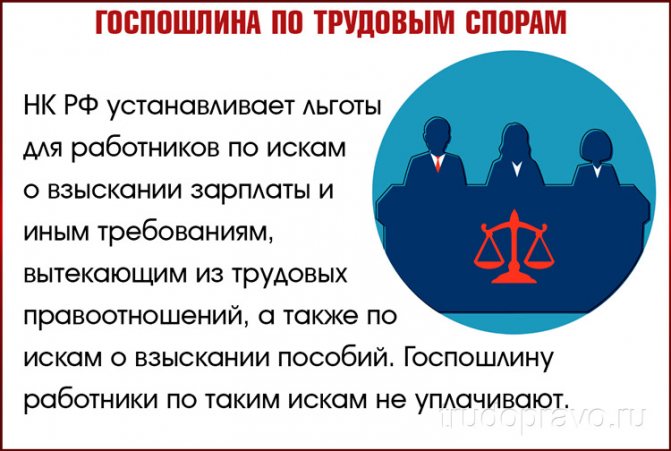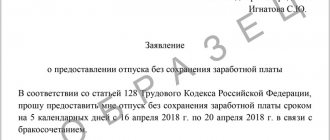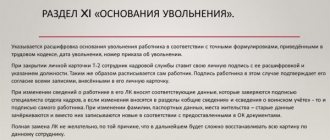State duty for refusal of a claim regarding labor relations
Exemption from payment of state duty applies regardless of the outcome of the court's consideration of the claim. The costs of paying the state duty are not recovered from the employee even if the claim is refused partially or in full (Resolution of the Plenum of the Supreme Court of the Russian Federation dated May 29, 2021 No. 15 “On the application by courts of legislation regulating the labor of employees working for employers - individuals and for employers - small businesses that are classified as micro-enterprises").
As explained by the Supreme Court of the Russian Federation, the rule on exempting an employee from legal costs when considering a labor dispute is aimed at ensuring his right to judicial protection in order to provide him with equal access to justice with the employer. Therefore, it is unlawful to impose on an employee the obligation to pay a state fee if the decision is made in favor of the defendant, both in the first instance and during the review of the case (Determination of the Judicial Collegium for Civil Cases of the Supreme Court of the Russian Federation dated October 6, 2014 No. 18-KG14-123) .
Is an appeal in labor disputes subject to state duty?
The Constitutional Court of the Russian Federation in its Determination dated December 21, 2011 N 1637-О-О states: having provided for the obligation to pay state fees in cases considered in courts of general jurisdiction and by justices of the peace, the legislator in Art. 333.36 of the Tax Code of the Russian Federation has established a list of cases when persons are exempt from paying it. In particular, in order to ensure the right of workers to judicial protection and provide them with equal access to justice with the employer in paragraphs. 1 clause 1 art. 333.36 of the Tax Code of the Russian Federation, the legislator exempted them from paying state duties on labor disputes (a similar norm is enshrined in Article 393 of the Labor Code of the Russian Federation). Based on the intended purpose of this provision, employees are exempt from paying state fees both for filing a statement of claim and when appealing court decisions in higher courts.
We recommend reading: How much do you need to earn to get into the poor in the Tula region
According to the Determination of the Constitutional Court of the Russian Federation of December 21, 2011 N 1637-О-О, plaintiffs are exempt from paying state fees in labor disputes, both for filing a statement of claim and when appealing court decisions in higher courts.
Article 220 of the Code of Civil Procedure. Grounds for termination of proceedings in a case The court terminates proceedings in a case if: there is a court decision or a court ruling on termination of proceedings in the case that has entered into legal force and was adopted on a dispute between the same parties, on the same subject and on the same grounds with the acceptance of the plaintiff’s refusal of the claim or the approval of a settlement agreement between the parties;
Payment of state duty by the employer in a labor dispute
Only employees, and not employers, are exempt from paying state fees for claims arising from labor relations (Resolution of the Plenum of the Supreme Court of the Russian Federation dated November 16, 2006 No. 52 “On the application by courts of legislation regulating the financial liability of employees for damage caused to the employer”). Therefore, the employer, in a claim against an employee, is obliged to pay a state duty in the usual amount established by Art.
333.19 of the Tax Code of the Russian Federation:
- if the claim is non-property - in the amount of 6,000 rubles for employers - organizations, and in the amount of 300 rubles for employers - individual entrepreneurs (clause 3, clause 1, article 333.19 of the Tax Code of the Russian Federation);
- if the claim is property (for example, compensation for damage caused to an employee), the state duty on it is paid in the amount established by clause. 1 clause 1 art. 333.19 of the Tax Code of the Russian Federation (Resolution of the Plenum of the Supreme Court of the Russian Federation of November 16, 2006 No. 52):
State duty on labor disputes: amount, exemption from payment
Claims related to illegal dismissal are also not subject to state duty: recovery of payment (lost earnings) for the period of forced absence, arrears in payment of compensation in connection with the termination of an employment contract, interest for late payment;
Exemption from payment of state duty applies regardless of the outcome of the court's consideration of the claim. The costs of paying the state duty are not recovered from the employee even if the claim is refused partially or in full (Resolution of the Plenum of the Supreme Court of the Russian Federation dated May 29, 2021 No. 15 “On the application by courts of legislation regulating the labor of employees working for employers - individuals and for employers - small businesses that are classified as micro-enterprises").
We recommend reading: Conditions for deregistration for alcohol
State duty for appealing GIT orders
The employer pays a state fee when appealing an order of a state labor inspector, as well as when filing complaints against decisions of the labor inspectorate in the amount of:
- 2000 rubles for employers of organizations) or
- 300 rubles for employers - individuals (IP).
This state duty is established by paragraphs. 7 p.
1 tbsp. 333.19 of the Tax Code of the Russian Federation for filing administrative claims to invalidate non-normative legal acts, as well as to invalidate decisions, actions or inactions of government bodies, which include the State Labor Inspectorate and its territorial divisions.
Still have questions? Contact a lawyer. The information above is general in nature and is not a substitute for legal advice regarding your specific dispute.
Expert opinion
Gusev Pavel Petrovich
Lawyer with 8 years of experience. Specialization: family law. Has experience in defense in court.
Labor relations between employers and employees are formalized by an agreement establishing mutual obligations and rights and are regulated by the Labor Code of the Russian Federation, state laws, agreements, and other regulatory documents.
Between the parties to such an agreement, misunderstandings and contradictions may arise regarding certain aspects of their relationship: the amount of payment, working conditions, compensation and benefits, etc. In legal practice, such disagreements are called individual labor disputes.
If a group of people comes into conflict with the employer, the dispute is called collective. The procedure for eliminating mutual claims is determined by the Labor Code of the Russian Federation.
Disputes regarding the recovery of moral damages
Although this category of disputes does not directly relate to disputes about the collection of wages, however, often the demand for recovery of moral damage is presented simultaneously with the main demand for the protection of violated labor rights. Resolution of the Plenum of the
Supreme Court of the Russian Federation No. 2 dated March 17, 2004 clarified that in in accordance with Part 4 of Article 3 and Part 9 of Article 394 of the Labor Code of the Russian Federation, the court has the right to satisfy the claim of a person who has been discriminated against in the sphere of labor, as well as the claim of an employee dismissed without legal grounds or in violation of the established procedure for dismissal or illegally transferred to another job for compensation moral harm. Considering that the Labor Code of the Russian Federation does not contain any restrictions for compensation for moral damage and in other cases of violation of the labor rights of workers, the court, by virtue of Articles 21 and 237 of the Labor Code of the Russian Federation, has the right to satisfy the employee’s demand for compensation for moral damage caused to him by any unlawful actions or inaction of the employer, including in case of violation of his property rights (for example, delay in payment of wages).
Thus, satisfaction of the claim for moral damages will depend on the court establishing (or not establishing) the fact of violations of the employee’s labor rights.
To summarize all of the above, we can say that in each case, despite the uniqueness of each situation, the main thing that the employer must prove is the legality of his actions.
Based on materials from the magazine “Our Accounting”
Resolution of individual disputes in courts of first instance
Art. 391 of the Labor Code of the Russian Federation names a list of employee claims that can be resolved exclusively in court:
- Cancellation of the dismissal order and reinstatement;
- On transfer at the request of the plaintiff to another job due to various circumstances;
- On compensation for the difference in pay for the period of filling a lower-paid position;
- About the amount of compensation for absenteeism due to reasons beyond the employee’s control;
- On changes in the order of data on the reasons for termination of work and the date of dismissal;
- About violation by the employer of the procedure for protecting personal data.
Only a court can consider an employer's claim for damages against an employee in the amount of material damage caused. On other issues, the parties can file a complaint with the labor dispute commission, the formation and procedure of which is established by the Labor Code of the Russian Federation.
The members of the commission, having considered the complaint, may refuse to make a decision or make it in favor of the employer. Then the employee needs to apply to the courts to protect his interests.
An employee can immediately file a claim on any issue. The hearing of the case is scheduled in the district court at the location of the defendant.
Amount of State Duty When Filing an Appeal in Labor Disputes in the Russian Federation 2021
Claims related to illegal dismissal are also not subject to state duty: recovery of payment (lost earnings) for the period of forced absence, arrears in payment of compensation in connection with the termination of an employment contract, interest for late payment;
Also, the amount of payments may be increased if, during the consideration of the case, circumstances are identified that could increase financial requirements. The established additional payment is made based on the outcome of the decision on the case and is assigned either to the applicant or to the defendant.
We recommend reading: What is required for 3 children in 2021 in the Volgograd region official
The employer will also have to pay a state fee if the claim is filed by the employee, and the court, recognizing his claims as legal, makes a decision in his favor. The amount of state duty on labor disputes that the employer will pay in this case is established by paragraphs. 3 p. 1 art. 333.19 of the Tax Code of the Russian Federation: for organizations - 6000 rubles, for individual entrepreneurs - 300 rubles.
At the request of employers, the court considers only cases of compensation for damage caused by the employee, and at the request of employees, disputes of a much wider range are resolved, including: reinstatement at work (regardless of the reasons for dismissal), changing the date, wording of the reason for termination of the contract, transfer to another job, about unlawful acts of the employer in the process of processing and protecting personal data, payment for forced absence, differences in wages during the performance of work paid at a lower rate.
State duty for employees
In the Russian Federation, filing an application with the courts is accompanied by the transfer of state fees in a certain amount to the budget. This fee is regulated by the Tax Code. The state duty on labor disputes in accordance with Article 333.36 of the Tax Code of the Russian Federation is not paid for the following claims:
- About non-payment of wages;
- On the collection of social benefits;
- For other issues arising as a result of the labor relationship between employer and employee.
The opportunity for workers filing claims in cases of labor disputes not to pay state duty is provided for in Art. 393 Labor Code of the Russian Federation.
It provides for exemption from all legal costs in any amount. This means that, even after losing the court, the plaintiff does not have to reimburse the funds spent on experts, translators, the amount of postage, transportation and other expenses of the parties and third parties associated with being summoned to a meeting, etc.
In the event that an individual dispute is lost, the court will not make a decision on the recovery of costs. This is explained in the documents of the plenary session of the Supreme Court No. 2 dated March 17, 2004.
State duty on labor disputes
Current as of: June 28, 2021
Individual labor disputes that arose between an employee and an employer and, in general, were not resolved with the help of a labor dispute commission, are resolved in court. And in some cases, disputes between the parties to labor relations are considered exclusively by the court without the involvement of the labor commission (Articles 382, 391 of the Labor Code of the Russian Federation). We will tell you about the state fee paid when going to court in connection with a labor dispute in our consultation.
State duty for the employer
The employer has the right to file a claim in the only case - if as a result of actions on the part of the employee, he suffered material damage. This can be done no later than a year from the moment the fact was discovered.
It turns out that the employer files a property claim in court. That is, this is no longer a labor dispute; the state duty in accordance with Article 333.19 of the Tax Code of the Russian Federation must be paid.
Its size will depend on the cost of the claim, but if it was not possible to estimate the amount of material damage, the employer will pay 6,000 rubles. If he wins the trial, he will be exempt from state fees and has the right to a refund of the funds spent.
Expert opinion
Gusev Pavel Petrovich
Lawyer with 8 years of experience. Specialization: family law. Has experience in defense in court.
Art. 393 of the Labor Code of the Russian Federation has nothing to do with the employer. If he is the losing party, he will have to pay the costs of the defendant and the third party in the amount determined by the court.
State duty amount
How much you need to pay will directly depend on the amount of the declared claims (Clause 1 of Article 333.19 of the Tax Code). The maximum fee does not exceed 60 thousand rubles.
It is important to know! There are situations when the amount of losses cannot be estimated. In this case, the state duty paid by the employer on labor disputes is six thousand rubles.
Four ways to transfer funds:
- Online banking. You can quickly make a payment in your Sberbank personal account through a mobile application or website.
- Yandex Money electronic wallet, Qiwi account. A commission is charged for the operation.
- Bank transfer. You can pay in cash at the operator, which will require additional time if there is a queue at the financial institution. It will be faster to carry out the transaction through a payment terminal.
- Payment is made on the official portal, or a mobile application can be used.
When paying, you must provide the correct information. To do this, you need to write out the court details in advance - look at this information on the information stand in the office or on the website.
Other authorities that help resolve a conflict situation:
- State authorities. These include the labor inspectorate and the prosecutor's office. You can submit your application online.
- Trade union or labor dispute commission. It is often possible to find a solution to a problem without bringing the conflict to court.
- Mediators. The procedure allows you to delicately resolve the dispute and keep the cause of the conflict secret from outsiders. To carry out mediation, an agreement is signed between the parties to the dispute. If the dispute has already been brought to court, then the parties also have the right to resort to the services of an intermediary - a mediator.
It is important to know! Sometimes the parties manage to resolve the conflict through negotiations. They involve the employer and the employee; during discussions, the points of view of both parties are taken into account and a decision is made that suits them.
The amount of state duty when applying to higher judicial authorities

If the district court leaves the claim for violation of rights unsatisfied, the employee can successively file an appeal, cassation and supervisory complaint. How and in what amount is the state duty paid on labor disputes in this case? The Court of Appeal is reviewing the case anew.
This is the first instance, but in a different composition; accordingly, there are benefits for exemption from payment of state duty for plaintiffs provided for by the Tax Code.
The Court of Cassation is the next step, which does not consider the labor dispute itself, but evaluates the correct application of legislative acts in previous decisions. On the basis that the Labor Code of the Russian Federation does not specify in which courts employees do not have to pay the state duty, when filing a cassation appeal the state duty is not paid.
In this regard, there is a ruling of the Constitutional Court of the Russian Federation dated December 21, 2011, which fully confirms this conclusion.
The supervisory complaint is submitted to the presidium of the court of the republic, territory, region in which previous claims were considered. What is the amount of the state duty if a labor dispute is resolved in a supervisory authority, is explained in a letter from the Ministry of Finance dated 05/05/2011.
The ministry’s conclusion is clear - the state duty must be paid in accordance with Art. 333.19 Tax Code of the Russian Federation.
For claims related to non-property interests of individuals, its amount is 200 rubles. For legal entities, the state duty will be 400 rubles.
You can see how to make a payment through Sberbank
Is there a fee for filing an appeal in a labor dispute? | Murmansk
Can file a cassation appeal with the presidium of the regional court and appeal to the Supreme Court of the Russian Federation
“Civil Procedure Code of the Russian Federation” dated November 14, 2002 N 138-FZ (as amended on December 19, 2016) (as amended and supplemented, entered into force on January 1, 2017)
Article 377. Procedure for filing a cassation appeal or presentation
(as amended by Federal Law dated December 9, 2010 N 353-FZ)
(see text in the previous edition)
1. Cassation appeals and presentations are filed directly with the cassation court.
2. Cassation appeals and presentations are submitted:
1) against appeal rulings of the supreme courts of republics, regional, regional courts, courts of federal cities, courts of an autonomous region, courts of autonomous districts; to appeal rulings of district courts; on court orders, decisions and determinations of district courts and magistrates that have entered into legal force - respectively, to the presidium of the supreme court of the republic, regional, regional court, court of a federal city, court of an autonomous region, court of an autonomous district;
2) against appeal rulings of district (naval) military courts; on decisions and rulings of garrison military courts that have entered into legal force - to the presidium of the district (naval) military court;
3) on decisions of the presidiums of the supreme courts of republics, regional, regional courts, courts of federal cities, courts of an autonomous region, courts of autonomous districts; on appeal rulings of the supreme courts of republics, regional, regional courts, courts of federal cities, courts of an autonomous region, courts of autonomous districts, as well as decisions and rulings of district courts that have entered into legal force, adopted by them at first instance, if these decisions and rulings were appealed to the presidium, respectively, of the supreme court of the republic, regional, regional court, court of a federal city, court of an autonomous region, court of an autonomous district - to the Judicial Collegium for Civil Cases of the Supreme Court of the Russian Federation;
(as amended by Federal Law dated 03/08/2015 N 23-FZ)
(see text in the previous edition)
4) on decisions of the presidiums of district (naval) military courts; against appeal rulings of district (naval) military courts, as well as against decisions and rulings of garrison military courts that have entered into legal force, if these court decisions were appealed to the presidium of the district (naval) military court - to the Judicial Collegium for Military Personnel of the Supreme Court of the Russian Federation .
(Clause 4 as amended by Federal Law dated March 12, 2014 N 29-FZ)
(see text in the previous edition)
3. The following have the right to submit requests for review of court decisions that have entered into legal force:
1) the Prosecutor General of the Russian Federation and his deputies - to any court of cassation;
2) the prosecutor of the republic, territory, region, federal city, autonomous region, autonomous district, military district (fleet) - respectively, to the presidium of the supreme court of the republic, regional, regional court, federal city court, autonomous region court, autonomous district court, district (naval) military court.
Who pays the state fee for filing a class action and how much?
Collective disputes are a very serious matter, because the interests of a large number of people are affected. Such conflicts between workers and employers can lead to a strike. Therefore, the Labor Code of the Russian Federation provides for a multi-stage system for pre-trial resolution of collective disputes.

Government bodies can be involved to resolve conflicts. Collective labor disputes rarely go to court. In cases where a claim is nevertheless filed, the state duty is not paid, because the plaintiffs are employees, and the subject of the claim is disagreements arising from labor relations.
Exemption of workers from reimbursement of expenses in the judicial settlement of labor disputes expands their ability to protect their interests and provides equal access to justice with the employer.
It is common for a dispute to arise between an employer and an employee. If the resolution of the conflict reaches a dead end, and even the labor dispute commission is unable to resolve it, then you have to go to court.
One of the mandatory conditions that must be met when filing an application with the court is the payment of the state fee. As a rule, the consideration of the case starts only after the amount specified by law is transferred to the state account. Typically, the payment of the state fee is made by the person filing the claim.
Labor dispute concept
The employer is often to blame for conflicts because he ignores the law. Here are a few examples: the boss does not pay wages or gives them in an envelope, refuses to transfer benefits during maternity leave, dismisses employees, forgetting about the algorithm for imposing penalties prescribed in the Labor Code of the Russian Federation (LC RF).
Such actions by the employer serve as grounds for going to court. However, a contract does not have to be signed between the parties. Even before joining the company, an unpleasant situation may occur. This is due to the fact that now many job advertisements are compiled incorrectly.
It is important to know! Often, recruiters do not hide the fact that they need young workers under 25 with a good appearance. Thus, the rights of other applicants are violated, since the refusal of employment must be related to professional qualities. Candidates for a vacant position can accept failure or appeal the demands of managers in court.

You can transfer the conflict into a peaceful direction by organizing negotiations or creating a commission at the enterprise. Next, you should get together and discuss the situation that has arisen, and come to a solution that will suit both parties. If the first participant needs to resolve the issue, but the opponent refuses to dialogue, then all that remains is to contact the competent structures or the court.
Two signs of a labor dispute:
- Disagreements arose between a boss and a subordinate regarding payment of wages, compliance with discipline, and other issues.
- The conflict has been referred to a court or other authorized body.
An individual conflict is a disagreement that arises between two participants. When the interests of several employees in an enterprise are violated, this is a collective dispute.
Nowadays, instead of an employment contract, a contract for the provision of services is often signed. Misunderstandings may also arise between the parties to civil law relations. But this is a different nature of the dispute, and it is resolved in the manner prescribed by the Civil Code of the Russian Federation.
State duty and determination of its size
State duty means a mandatory fee, the payment of which is provided for by law in case of contacting a government agency when there is a need for it to implement a certain function.
When there is a property dispute (providing for the recovery of material resources from the guilty party), the amount of state duty is calculated based on the monetary compensation provided for in the claim.
If we are talking about non-property claims, then the amount of the state duty on labor disputes is determined by the current regulatory documents and is fixed. The amount is different for individuals and legal entities: the former must pay 300 rubles, while the latter – 6,000 rubles.
Payment options
The state duty on labor disputes can be repaid in one of the following ways:
- by depositing cash at Sberbank branches through cash desks or special terminals;
- by cash payment at one of the post offices;
- non-cash method by transferring from the company's current account.
In order to confirm in court that the state duty has been paid, it is necessary to request a receipt for this transaction from the department where the money was deposited.
Payment of state duty by employees
Article 393 of the Labor Code sets out a rule according to which the state duty on labor disputes is not paid by employees if the claim is filed in a court of general jurisdiction.
In addition, there is a ruling of the Constitutional Court, from which it follows that workers are also exempt from paying state duty if they file claims regarding labor disputes in the appellate courts.
At the same time, payment of the required amount to employees cannot be avoided when the case is scheduled to be considered in the supervisory and cassation courts. Moreover, the transfer of the proper amount must be made regardless of whether the case is a losing or winning one for the employee himself.
The amount of state duty on labor disputes in this case is determined by paragraph 1 of Article 333.19 of the Tax Code.
State duty on labor disputes
The Tax Code of the Russian Federation establishes benefits for employees in claims for the recovery of wages and other claims arising from labor relations, as well as in claims for the recovery of benefits. Employees do not pay state duty on such claims (clause 1, clause 1, article 333.36 of the Tax Code of the Russian Federation, clause 4 of the Resolution of the Plenum of the Supreme Court of March 17, 2004 No. 2).
This is important to know: The procedure for rewarding and imposing disciplinary sanctions on military personnel
Employers, when filing a labor claim in court, pay a state duty in the amounts provided for when cases are considered by courts of general jurisdiction in accordance with Art. 333.19 Tax Code of the Russian Federation.
Nuances of payment of state duty by legal entities-employers
Expert opinion
Gusev Pavel Petrovich
Lawyer with 8 years of experience. Specialization: family law. Has experience in defense in court.
The norms of labor and tax legislation when resolving labor disputes in court do not provide for any benefits regarding the transfer of state duties from employers who are legal entities.
Article 392 of the Labor Code of the Russian Federation dictates the possibility of an employer filing a lawsuit against its employee only in order to recover from the latter the amount of material damage caused to him. The amount of the state duty for labor disputes in this case will be floating and dependent directly on the cost of the claim, determined by the amount of property damage caused.
If a property claim is filed, the price of which cannot be properly determined, then the employer-legal entity must pay a fixed amount of 6,000 rubles. Complete exemption of the employer from transferring state duty is possible provided that the court makes a decision in his favor.
Persons exempt from paying state duty
Article 333.35 clearly defines the list of persons who do not need to pay state fees when applying to the court:
- WWII veterans and those who became disabled during hostilities, as well as persons who were captured;
- citizens who were forcibly held by the Nazis in concentration camps and similar places of confinement;
- received the title of Hero of the USSR or Hero of the Russian Federation;
- full holders of the Order of Glory.
The employer is given the opportunity, when filing a claim for compensation for material damage incurred as a result of the employee’s actions, to include the amount of the state duty in the claims presented to the guilty employee.
State duty when applying to the courts of second instance
To the Court of Appeal
The Tax Code contains a rule that exempts a person filing a claim in connection with a labor dispute in a court of general jurisdiction from paying state fees. However, if a person remains dissatisfied with the decision, he can appeal to the judicial organization of the second instance, and the Tax Code does not say anything regarding exemption from paying state duty in this case.
The employer will not be able to avoid paying the fee if he decides to file a complaint with the appellate authority, since neither tax nor labor legislation provides for any benefits for him. An appeal is allowed within 10 days from the moment the court of first instance made its decision.
To the Court of Cassation
If an employee wants to challenge a decision of the court of first instance that has already been made and has already entered into force, he will have to appeal to the court of cassation, which also belongs to the second instance. The employer has the right to file the same complaint.
Based on the above-mentioned Determination made by the Constitutional Court, the employee does not need to pay the fee, while the employer is responsible for paying the full amount of this payment.
However, on May 5, 2011, the Ministry of Finance published a letter according to which the employee is not exempt from paying state duty if he decides to file a cassation and supervisory appeal. In this case, the amount of payment is determined based on the norms prescribed in paragraph 1 of Article 333.19 of the Tax Code.
Summing up
Thus, payment of the state fee is one of the mandatory conditions for the court to consider the claim. The employee does not need to make this payment if he goes to the district court or files an appeal to the second level court to appeal the previous decision.
An appeal through a cassation or supervisory procedure does not relieve you of payment. When filing a claim of a non-material nature, the employer must in any case pay a state fee in the amount established by the regulations.
During a working interaction, the parties may be dissatisfied with each other or question the legality of a particular action. The dispute can be resolved independently, and if a positive result is not achieved, then either party to the employment agreement can file a claim in court.
Courts charge a fee for the consideration of cases, the amount of which depends on the subject of the dispute and on who the applicant is - an individual or a legal entity. The state duty on labor disputes is regulated by the legislative norms of the Russian Federation, and its collection is carried out in accordance with the established procedure.
Cases of going to court
To resolve any disagreements that arise during the interaction between the parties to an employment contract, there are several recommended ways:
- Internal settlement, when an agreement is reached within the organization itself without the involvement of outside specialists.
- Contacting the Labor Inspectorate. This service was created precisely to maintain a balance of interests of the employer and employees.
- A petition to the prosecutor's office, which must not only be considered, but also based on it, the circumstances must be checked and violations identified.
The injured party can choose any of the proposed ways to solve the problem, you can not adhere to hierarchy and apply those measures that seem most necessary and effective.

If none of the chosen methods of resolving the dispute brings results, then the injured party can go to court.
Labor disputes initiated by employees may arise due to:
- Illegal dismissal from work, with a demand for reinstatement at work.
- Incorrectly specified reason for termination of the contract or its date.
- Transfer to another position without the employee’s consent.
- Wages not paid on time or not paid in full.
Employers may file claims based on the need to recover property damages.
Courts accept only individual claims for consideration, while collective claims are considered in a different manner with the creation of a special labor commission.
Applying to court to resolve a labor dispute
It is better to approach the legal process thoroughly - collect evidence, competently draw up a claim. In many cases, it is more convenient to complain to labor inspectors, the prosecutor's office, or convene a commission (CCC).
Inspectors protect the interests of employees in issues such as non-payment or delay of wages, illegal dismissal, refusal to formalize an employment contract. The application can be submitted to the government agency by registered mail, delivered in person, or sent online, if technically possible. The inspectors will issue an order that the employer will be forced to comply with. If you take the dispute to court, it means that the labor inspectorate will no longer be able to intervene in the conflict (Article 357 of the Labor Code of the Russian Federation).
Which judicial authority you should contact depends on the situation:
- The dispute is not related to reinstatement. This means that the magistrate’s court will be able to consider it.
- It is necessary to challenge the dismissal or the employer violated the law when processing personal data. The dispute falls under the jurisdiction of the district court.
Advice! It is necessary to immediately find out the nature of the conflict in order to avoid problems. If the case does not fall within the competence of the state body, a refusal determination is issued. You will have to re-draft the application and submit it again according to your jurisdiction.
The legislative framework
Problems do not need to be hushed up or their solution should be put on hold. Lost time to file a claim is difficult to resume; you will have to prove that the absence was due to valid reasons (Articles 391, 392 of the Labor Code of the Russian Federation).
Deadlines for consideration of labor conflicts:
- One year. The employer is given a sufficient amount of time to calculate and recover material losses from subordinates.
- Three months. You can contact the labor commission during this period.
- Thirty days. This is how much an employee has to challenge unlawful dismissal. Time is counted from the date on which the work book or order to terminate the contract was issued.
- Ten days. There is the least amount of time left to appeal the labor commission's verdict. The period is counted within 3 days from the date of receipt by the parties of the decision made by the CCC (Articles 388, 389 of the Labor Code of the Russian Federation).
To resolve collective disagreements, special conciliation procedures are used, for example, employees can take a break from work by going on strike.
Issues covered
Most disagreements that arise in the office or at work can be referred to labor commissions. It is convenient to contact them - just submit an application written in any form. But there is a list of cases that only the court can decide:
- Reinstatement in case of illegal dismissal.
- Changing the date and reason for termination of the contract. The work book will contain dismissal by agreement of the parties instead of an unpleasant article for violation of work discipline.
- Transition to easier work. This is especially true for women during pregnancy, when their workload decreases.
- Prosecution for disclosure of personal information. Both parties to the employment relationship are required to maintain confidentiality.
- Appealing an unreasonable refusal of employment. If the vacancy is worth it, you need to challenge the discrimination in court.
- Compensation for damage. The employer can recover damages from the storekeeper, seller and other employees with whom the liability agreement has been signed.
The requirements need to be justified; acts, certificates, contracts, copies of documents, witness statements, audio and video recordings will help with this.
The need to pay state duty
When submitting a statement of claim to the court, the applicant is charged a state fee.
A state fee is a payment that is made to the account of a specific organization for the fact that they will consider and register some fact. In the case of judicial proceedings, we are talking not only about registering a legal fact, but also about considering the case as a whole, as well as making a balanced and legally verified decision.
The state fee is paid before the claim is accepted for consideration, and a receipt for payment is attached to the general package of documents. However, this does not mean that you should not file complaints without a receipt.
The Tax Code of the Russian Federation provides many reasons for providing benefits, namely reducing the size of payments or their complete abolition. Before filing a claim, it is better to first clarify whether there is a benefit in this particular case.
For employee
The Labor Code of the Russian Federation and the Tax Code regulate that employees, when resolving individual labor disputes through courts of general jurisdiction, are exempt from paying duties.

Article 333.36 of the Tax Code of the Russian Federation states that a hired person cannot be subject to state duty if he files a claim for:
- payment of previously unpaid part of wages or other payments;
- accrual of penalties, fines, compensation for moral or physical damage caused;
- other issues that arise in the process of labor interaction.
When the case is reviewed by higher authorities, the employee also has no reason to pay for the appeal filed. Although the Tax Code does not clearly indicate this fact, the Constitutional Court made just such a decision when considering a dispute about the need to collect duties from individuals on labor claims.
For the employer
There is not a single article in the legislative norms of the Russian Federation that talks about the possibility of reducing the state duty or its complete abolition when resolving labor disputes for employers. Moreover, the employer must pay the amount that is calculated for legal entities.
An employer can file a claim only in one case, if it claims the need for financial penalties from the employee. In this case, the fee directly depends on the amount of the claim. It is noteworthy that the collection of legal costs from the employing organization is carried out not only when it is the applicant, but also if it acts as a defendant.
Expert opinion
Gusev Pavel Petrovich
Lawyer with 8 years of experience. Specialization: family law. Has experience in defense in court.
The employer pays the full amount of state duty when applying to courts of general jurisdiction, appellate and cassation instances, and supervisory judicial organizations.
The state duty will not be charged to the employer if the guilt of the employee is established, and all penalties will be made from him.
State duty to the labor court
— Business organization — Law and law — State duty on labor disputes
In certain cases, individual labor conflicts arising between an employer and a subordinate are resolved only through judicial proceedings. When applying to the specified government agency, there is a need to pay a state fee for labor disputes. The procedure for its introduction has its own nuances and features, which it is advisable to familiarize yourself with before the start of litigation.
Circumstances of applying to the labor court
For a dispute to be of a labor nature, a labor agreement must be concluded between the parties (employer and subordinate). Most often, the causes of the conflict are illegal adjustments to this document or ignoring its provisions.
In accordance with Art. 72 of the Labor Code of the Russian Federation, neither a manager nor an employee has the right to adjust the provisions of their agreement according to their own will without the knowledge of the other party.
There are several legitimate options for resolving work disagreements:
- internal regulation. At the local level, a special commission is organized and disputes are resolved without the involvement of outside specialists;
- appeal to the State Labor Inspectorate (GTI). This structure is designed to resolve those controversial issues on which it was not possible to reach agreement during their internal consideration by the parties to the conflict;
- one of the parties going to court to protect their rights if the above methods are unsuccessful. The claim will be considered and, on its basis, an inspection will be carried out in order to identify and eliminate existing violations.
They are sent to court only in private work conflicts between a manager and his subordinate. Collective conflicts are not within the jurisdiction of the courts.
In turn, collective disagreements are referred to a specialized conciliation commission established by the employer together with his subordinates.
Private disagreements are resolved in magistrates' courts, with the exception of those cases in which the issue of recovery of wages or other types of compensation payments appears. These cases are referred to the district authority for consideration.
In the case where the applicant is an employee of the company, the statement of claim should be sent to the local branch of the court located at the location of the employer.
In conditions where an employee works in a separate division or branch, he has the right to go to court at the location of the main office or division of the business entity. In circumstances where the initiator of the litigation is the employer, the claim is filed by him at the place of residence of the subordinate.
An employee has the right to file an application with the court for the following reasons:
- for the purpose of reinstatement, regardless of the reasons why the agreement with the subject was terminated (the rule is relevant if the person was not dismissed due to offenses committed);
- adjustments were made to the date of dismissal and the wording of the reason for the citizen’s resignation from his position that were not agreed upon with him;
- due to unjustified transfer to another position;
- to resolve issues regarding payment of earnings;
- for any other reasons provided for in Art. 391 Labor Code of the Russian Federation.
The employer has the right to file a lawsuit only to request compensation for material damage caused to him or the property of an economic entity by an employee.
The need to pay a state fee when applying to a labor court
The fee for labor disputes accompanies the filing of a claim on the relevant issue.
The state duty is understood as a certain amount of financial resources paid to the court for the fact that it considers a case and makes a certain verdict on it.
In circumstances involving a labor dispute, we are talking not only about issuing a conciliatory verdict, but also about drawing up a list of recommendations or mandatory requirements to eliminate certain violations in the company.
The fee must be paid before the commencement of the consideration of the filed claim. This is due to the need to add a receipt to the general package of papers. However, it is legal to go to court even without a receipt.
Modern tax legislation provides a number of benefits that allow you to reduce the standard amount of duty or not pay it at all.
To do this, the entity must familiarize itself in detail with the procedure for paying the duty and determine whether it has sufficient grounds to assign such a preference to it.
Categories of persons who are exempt from paying state duty on labor disputes
Based on Art. 333.35 of the Tax Code of the Russian Federation, there is a clearly regulated list of entities exempt from the need to pay state duty when sending a statement of claim to the judicial service.
In particular, this category includes:
- Veterans of the Great Patriotic War, as well as persons with official confirmation of a disability acquired during combat operations. This category also includes subjects who survived captivity.
- Persons who survived being forced into fascist concentration camps, as well as other similar places of confinement.
- Citizens who were awarded the honorary title of Hero of the USSR or the Russian Federation, as well as persons who received the Order of Glory.
In turn, the employer is given the right to include the costs incurred to pay the fee in the total amount of the claim for compensation for material damage in the event of any illegal actions of the employee.
Features of appealing to the appellate authority in labor disputes
The tax legislation outlines a provision based on which an employed person who files a claim on the issue under consideration to a court of general jurisdiction may not pay state duty.
In conditions where a court of general jurisdiction has issued a verdict that does not satisfy the interests of the plaintiff, he has the right to go to the appellate service, that is, to the court of second instance. In these circumstances, tax legislation does not regulate the absence of the need to pay a duty.
Therefore, in order to clarify the position in question, it is advisable to pay attention to judicial practice.
It shows that an employee does not pay funds if he files a claim to resolve a private work conflict, regardless of the jurisdiction in which he files the document.
That is, an employee should not pay a fee, based on judicial practice, either when initially sending documents to the court, or when filing an appeal.
In turn, in case of an appeal in labor disputes, the state duty for the employer is a necessary condition for the lawful implementation of the procedure. This is due to the lack of preferences for employers on this issue in tax and labor legislation.
In particular, filing a claim with the authority under consideration is lawful within the first 10 days from the date when the court of first jurisdiction issued a verdict that does not satisfy the interests of the party.
Thus, when appealing a labor dispute, the state duty is paid only by the employer (in conditions where he is the initiator of the proceedings).






